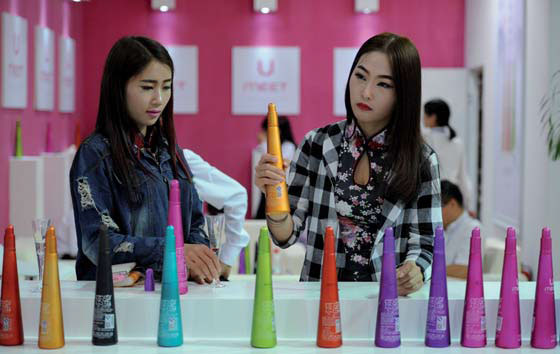Drinks companies have their eyes on the ladies
Updated: 2015-10-09 07:23
By Wang Zhuoqiong and Yang Jun(China Daily Europe)
|
|||||||||||
In a move to boost sales, leading alcoholic beverage businesses are targeting the women's market in China
Sandy Xia enjoys a glass of wine when having lunch with friends. In the evening, she has the occasional beer and one or two cocktails on the weekend.
With a busy business schedule, the 32-year-old marketing manager at a logistics company in Beijing is constantly on the go.
|
U MEET, an alcoholic drink for women, is unveiled by Kweichow Moutai Co Ltd in Guiyang, Guizhou province. Zhao Hui / For China Daily |
"Having a healthy portion of alcohol helps me relax. I enjoy having a drink when I mix with friends, and we often talk about various wines and spirits," she says.
Xia is just the sort of middle-class professional woman that major beverage companies are looking to target to prop up falling sales after the government launched its anti-corruption campaign at the end of 2012.
Since then, the fallout has affected the luxury goods industry as well as the alcoholic drinks sector. In a move to boost sales, China's leading baijiu producer, Kweichow Moutai Co Ltd, has rolled a new drink for women customers.
U MEET comes in an elegant, elongated perfume-style bottle and is mixed with high-grade liquor from Moutai and natural blueberry juice.
Yuan Renguo, chairman of the group, has predicted that sales revenue from U MEET will be between 1 billion yuan ($156 million) and 1.5 billion yuan in three years. Moutai is banking on its highly successful brand name to stimulate growth.
With a female population of about 630 million in China, leading beverage companies are hoping to tempt women consumers in the 18 to 59 age group, who make up 60 percent of the overall total. U MEET, for example, comes in nine colors and will retail at 48 yuan a bottle. It is expected to become popular with the younger generation, who love trendy nightclubs.
But Moutai, which is famous for producing baijiu, which is made from a mixture of grains such as sorghum, wheat and corn, faces tough competition in a crowded marketplace.
Global player Diageo Plc has always had a major presence in the sector with the company's Baileys brand, popular with women drinkers. The multinational alcoholic beverages group from the United Kingdom is expanding distribution of Baileys, an Irish whiskey and cream-based liqueur, through e-commerce sites and convenience stores.
"We have also updated the bottle size for Baileys from 750 milliliters to a smaller size, so female customers will find it easy to carry and share with friends at parties or at picnics," says Tang Wu, Diageo's brand communications public relations manager.
In another strategic move, Baileys is now collaborating with Costa Coffee, a UK coffee chain, to develop a beverage named Cortado for the Chinese market.
Driving growth in China has become a priority for leading spirits labels such as Diageo and Pernod Ricard, a multinational beverages group based in France. Even Chinese companies that produce baijiu, which has 99 percent of market share in the spirits category, have felt the pain.
Upmarket brands have cut prices by nearly 50 percent, according to a 2014 report released by Mintel Group Ltd, the global market research firm based in the UK.
In the wine industry, the impact has been more pronounced, despite the fact that China consumed 155 million cases in 2013, making it the world's No 1 market. France and Italy are just behind. The slow growth in beer sales is another problem as the sector has reached a saturation point.
"(Yet,) while luxury and premium drinks have been affected, midrange products targeting the mass market have seen a surge," Mintel reports. "The market is moving from a business-driven model to a consumer-centric model, with socializing with friends and family the top two occasions (when alcoholic drinks are consumed)."
Contact the writers through wangzhuoqiong@chinadaily.com.cn
Today's Top News
Xi's trip to herald 'golden decade' for relations
Wanda's chairman Wang again becomes richest Chinese
Ex-NBA star Odom reported critical, Kardashian at his side
Country house to add English tradition to Xi, Cameron meeting
Most Chinese cities failing air quality standards: Report
Xi to initiate 'golden era' in China-UK ties
China's September inflation cooler than expected
Sensible strategic move by Russia to give Assad support
Hot Topics
Lunar probe , China growth forecasts, Emission rules get tougher, China seen through 'colored lens', International board,
Editor's Picks

|

|

|

|

|

|







